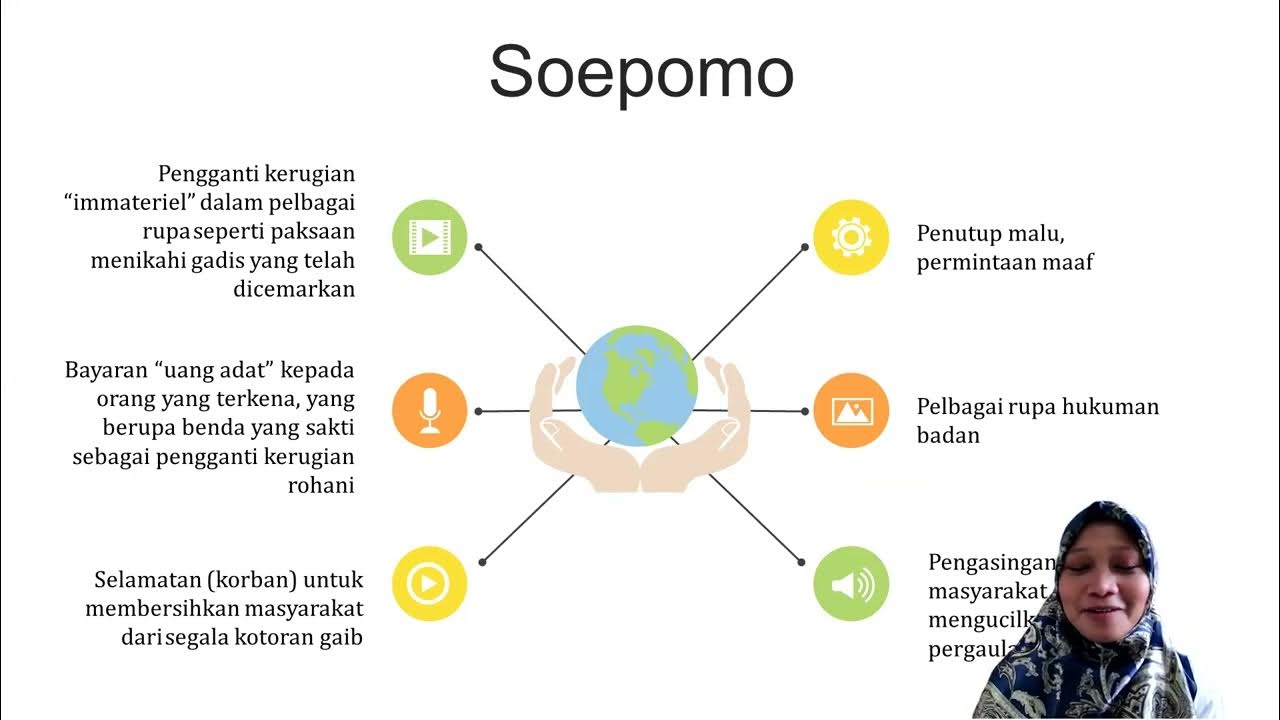Hukum Adat di Indonesia: Ilmu, Kebudayaan dan Sejarah
Summary
TLDRThe transcript delves into the concept of *hukum adat* (customary law) in Indonesia, which is often confused with customary practices but is distinct in its legal implications. It explores the origins of the term, introduced by Dutch scholar Snouck Hurgronje, and its application in various Indonesian communities. Specific examples include the Javanese calendar law, Balinese *awig-awig*, Dayak *kalis*, and other customs like *tikam tanah* and *mualang butan*. These practices govern everything from social interactions to marriage and punishments, showcasing the rich diversity of Indonesia's traditional legal systems.
Takeaways
- 😀 The term 'adat law' (customary law) is often confused with customary practices but is not directly recognized in indigenous communities.
- 😀 The concept of 'adat law' was first introduced by Snouck Hurgronje, a Dutch scholar, in his 1894 work 'The Archers'.
- 😀 'Adat law' involves customs that come with legal sanctions if violated.
- 😀 In Java, 'adat law' includes the calculation of the Javanese calendar, which is not only mystical but also necessary for events like weddings and rituals.
- 😀 'Awig-awig' is the customary law in Bali, which governs community life and includes penalties like fines or excommunication for violations.
- 😀 The Dayak Kalimantan people have four types of customary laws, each with specific punishments based on the severity of the offense, ranging from minor incidents to death penalties.
- 😀 In the Dayak Kalimantan system, punishments can be imposed even if the individual is later brought to official legal authorities.
- 😀 The 'Tikam Tanah' ritual is a customary law practice in which outsiders entering a village perform a ritual for safety and to seek protection from ancestors.
- 😀 'Mualang Butan' is a form of customary law related to marriage, focusing on extramarital affairs or adultery within the Dayak community.
- 😀 The script highlights that many of these customary laws still exist in Indonesia, influencing societal norms and behaviors.
Q & A
What is 'hukum adat' and how is it different from 'hukum kebiasaan'?
-'Hukum adat' refers to customary law in Indonesia, a set of legal principles based on traditions and practices specific to certain communities. It is distinct from 'hukum kebiasaan' (customary law) because 'hukum adat' is a more formalized system of law with sanctions, while 'hukum kebiasaan' refers to regular practices that may not carry legal consequences.
Who introduced the term 'hukum adat' and when?
-The term 'hukum adat' was introduced by Snouck Hurgronje, a Dutch scholar, in his book 'The Archers' published in 1894. He defined it as 'adat direct given Herbert,' which translates to customs with legal sanctions.
What does the term 'hukum adat' imply in terms of legal consequences?
-The term 'hukum adat' implies that if a custom or law is violated, it leads to legal sanctions. This sets it apart from general customs, which may not necessarily involve any legal repercussions.
How is the Javanese calendar related to 'hukum adat'?
-The Javanese calendar, as part of 'hukum adat,' is used for various ceremonial purposes, such as determining wedding dates and other cultural rituals. It has spiritual significance and is believed to influence divine approval for certain events.
What is the 'awig-awig' system in Bali?
-'Awig-awig' refers to a set of customary laws or regulations in Bali, specifically governing the interactions and behaviors within the community. It includes fines, social penalties, and practices designed to maintain harmony within the village.
What are some of the sanctions under the 'awig-awig' system?
-The sanctions under 'awig-awig' in Bali include financial fines (dodosaan), social exclusion (rampang), or even banishment from the village (kazelong), among others. These measures help maintain community discipline and adherence to customs.
What are the types of customary law within the Dayak Kalimantan community?
-The Dayak Kalimantan community has four types of customary law: 'sahut' (minor offenses), 'setengah Baar' (semi-lethal injuries), 'nyala' (fatal injuries), and 'adat Kampung' (immediate punishment for clear violations). These laws address various offenses based on severity.
What happens when a Dayak community member commits a serious offense?
-If a serious offense occurs, such as causing severe injury or death, the offender is subjected to customary law first, but may still face formal legal proceedings through the authorities.
What is the significance of the 'tikam tanah' ritual in Dayak customs?
-The 'tikam tanah' ritual is a traditional practice among the Dayak people, where an outsider entering the village undergoes a ceremonial act to ensure safety and peaceful coexistence with the community. It acts as a signal to the ancestors for protection.
What is the 'hukum adat mualang butan' in the context of marriage?
-'Hukum adat mualang butan' is a customary law relating to infidelity in marriage among the Dayak people. It addresses cases of adultery, where a married man or woman engages in an affair outside the marriage, and sets penalties according to local traditions.
Outlines

This section is available to paid users only. Please upgrade to access this part.
Upgrade NowMindmap

This section is available to paid users only. Please upgrade to access this part.
Upgrade NowKeywords

This section is available to paid users only. Please upgrade to access this part.
Upgrade NowHighlights

This section is available to paid users only. Please upgrade to access this part.
Upgrade NowTranscripts

This section is available to paid users only. Please upgrade to access this part.
Upgrade Now5.0 / 5 (0 votes)





